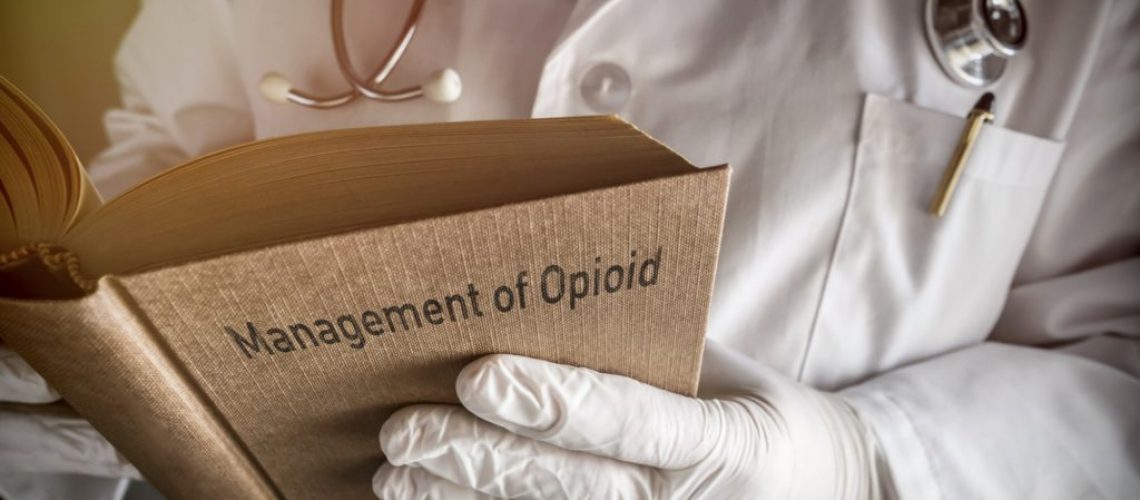Opiates or opioids are drugs used to treat pain. The term narcotic refers to either type of drug.
If you stop or cut back on these drugs after heavy use of a few weeks or more, you will have a number of symptoms. This is called withdrawal.
Causes
In 2016 in the United States, about 948,000 people used heroin during the past year. In the same year, about 11.5 million people were nonmedical users of narcotic pain relievers. This means they were taking narcotics that were not prescribed to them. Narcotic pain relievers include:- Codeine
- Heroin
- Hydrocodone (Vicodin)
- Hydromorphone (Dilaudid)
- Methadone
- Meperidine (Demerol)
- Morphine
- Oxycodone (Percocet or Oxycontin)
Symptoms
Early symptoms of withdrawal include:- Agitation
- Anxiety
- Muscle aches
- Increased tearing
- Insomnia
- Runny nose
- Sweating
- Yawning
- Abdominal cramping
- Diarrhea
- Dilated pupils
- Goose bumps
- Nausea
- Vomiting
Exams and Tests
Your health care provider will perform a physical exam and ask questions about your medical history and drug use. Urine or blood tests to screen for drugs can confirm opiate use. Other testing will depend on your provider’s concern for other problems. Tests may include:- Blood chemistries and liver function tests such as CHEM-20
- CBC (complete blood count, measures red and white blood cells, and platelets, which help blood to clot)
- Chest x-ray
- ECG (electrocardiogram, or heart tracing)
- Testing for hepatitis C, HIV, and tuberculosis (TB), as many people who abuse opiates also have these diseases
Treatment
Withdrawal from these drugs on your own can be very hard and may be dangerous. Treatment most often involves medicines, counseling, and support. You and your provider will discuss your care and treatment goals. Withdrawal can take place in a number of settings:- At-home, using medicines and a strong support system. (This method is difficult, and withdrawal should be done very slowly.)
- Using facilities set up to help people with detoxification (detox).
- In a regular hospital, if symptoms are severe.
- Treat vomiting and diarrhea
- Help with sleep
- Self-help groups, like Narcotics Anonymous or SMART Recovery
- Outpatient counseling
- Intensive outpatient treatment (day hospitalization)
- Inpatient treatment
Support Groups
Support groups, such as Narcotics Anonymous and SMART Recovery, can be enormously helpful to people addicted to opiates:- Narcotics Anonymous — www.na.org
- SMART Recovery — www.smartrecovery.org
Outlook (Prognosis)
Withdrawal from opiates is painful, but usually not life threatening.Possible Complications
Complications include vomiting and breathing in stomach contents into the lungs. This is called aspiration, and it can cause lung infection. Vomiting and diarrhea can cause dehydration and body chemical and mineral (electrolyte) disturbances. The biggest complication is returning to drug use. Most opiate overdose deaths occur in people who have just detoxed. Withdrawal reduces the person’s tolerance to the drug, so those who have just gone through withdrawal can overdose on a much smaller dose than they used to take.When to Contact a Medical Professional
Call your provider if you are using or withdrawing from opiates.Alternative Names
Withdrawal from opioids; Dopesickness; Substance use – opiate withdrawal; Substance abuse – opiate withdrawal; Drug abuse – opiate withdrawal; Narcotic abuse – opiate withdrawal; Methadone – opiate withdrawal; Pain medicines – opiate withdrawal; Heroin abuse – opiate withdrawal; Morphine abuse – opiate withdrawal; Opoid withdrawal; Meperidine – opiate withdrawal; Dilaudid – opiate withdrawal; Oxycodone – opiate withdrawal; Percocet – opiate withdrawal; Oxycontin – opiate withdrawal; Hydrocodone – opiate withdrawal; Detox – opiates; Detoxification – opiatesReferences
Kampman K, Jarvis M. American Society of Addiction Medicine (ASAM) National Practice Guideline for the Use of Medications in the Treatment of Addiction Involving Opioid Use. J Addict Med. 2015;9(5):358-367. PMID: 26406300 www.ncbi.nlm.nih.gov/pubmed/26406300. Nikolaides JK, Thompson TM. Opioids. In: Walls RM, Hockberger RS, Gausche-Hill M, eds. Rosen’s Emergency Medicine: Concepts and Clinical Practice. 9th ed. Philadelphia, PA: Elsevier; 2018:chap 156. Substance Abuse and Mental Health Services Administration (SAMHSA) website. Key substance use and mental health indicators in the United States: results from the 2016 National Survey on Drug Use and Health. www.samhsa.gov/data/sites/default/files/NSDUH-FFR1-2016/NSDUH-FFR1-2016.htm. Updated September 2017. Accessed July 18, 2018.Review Date 5/5/2018
Updated by: Fred K. Berger, MD, addiction and forensic psychiatrist, Scripps Memorial Hospital, La Jolla, CA. Also reviewed by David Zieve, MD, MHA, Medical Director, Brenda Conaway, Editorial Director, and the A.D.A.M. Editorial team.Outpatient Detox
7251 W Palmetto Park Rd. Suite 204, Boca Raton, FL 33431
(561) 901-0040

